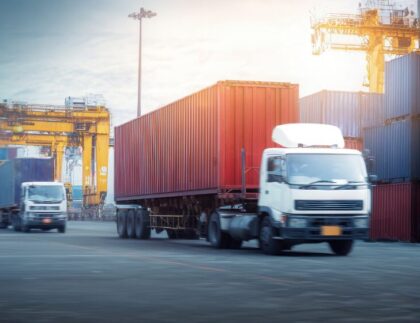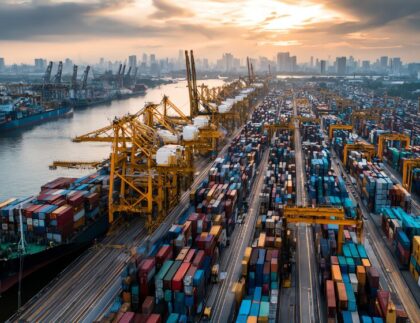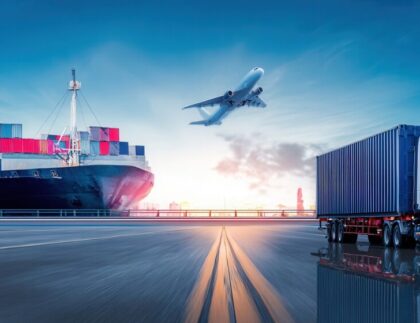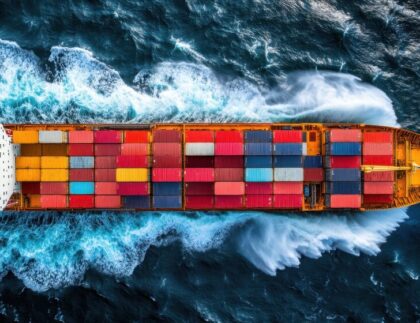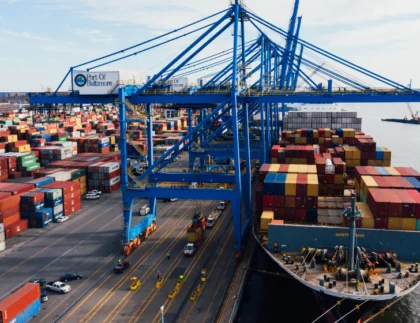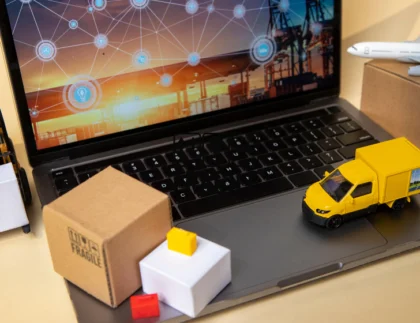
Urbanization is not just a trend but a transformative force reshaping the world into smart cities. These cities, powered by technology, are revolutionizing infrastructure, sustainability, and quality of life. Nowhere is this transformation more profound than in logistics.
Implementing new technologies, modern strategies, and sustainable options, all driven by technology, fundamentally changes how goods are moved and delivered in urban settings, inspiring us with the potential of what's to come.
This article explores the latest innovations and trends in smart city logistics, focusing on their implications for air freight, land freight, sea freight, and specialized services like FBA (Fulfilment by Amazon).
The Role of Smart Cities in Urban Freight Innovation
The IoT (Internet of Things), AI (artificial intelligence), and significant data analytics work together to create the digital infrastructure that supports smart cities. These technologies have enabled real-time cargo tracking, autonomous evaluation of supply chains, and interaction with various network components. They play a significant role in optimizing freight movement, reducing road congestion, and enhancing the efficiency of logistics services.
IoT sensors installed on vehicles like trucks or shipping containers can gather and send information about the shipment's location and condition while moving. This is especially critical in air freight, where delivery is essential for perishable items or urgent shipments. Likewise, land freight benefits from AI-driven dynamic routing systems that adapt delivery paths based on traffic and weather conditions.
These innovations improve operational efficiency and play a crucial role in sustainable urban transport. By minimizing fuel consumption and emissions, smart city logistics significantly reduce the environmental impact of urban freight operations, aligning with global sustainability goals and enhancing brand reputation among eco-conscious consumers.

Innovations Driving Smart City Logistics
1. IoT in Logistics
IoT improves logistics by providing real-time visibility into every supply chain step. IoT devices provide efficiency and transparency in various applications, from warehouse inventory monitoring to shipment tracking. For example, RFID tags and sophisticated sensors allow logistics companies to track stock levels more accurately, decreasing waste and improving order fulfilment rates. This technology is critical in managing complex activities such as FBA, which demand smooth e-commerce integration, demonstrating its multifaceted value.
2. Last-Mile Delivery Trends
The last-mile delivery industry is undergoing significant changes to tackle challenges like urban traffic congestion and scarce curb space. Advancements such as drones, autonomous delivery vehicles, and compact distribution centres might drastically change the landscape of this sector. These technological innovations decrease delivery expenses, cut carbon emissions, and improve delivery speed. For instance, self-driving vehicles that utilize artificial intelligence can manoeuvre through busy streets, guaranteeing timely ground freight delivery and online purchases.
3. Logistics Automation
Automation is at the heart of modern logistics solutions. From robotic process automation (RPA) in warehouses to self-driving trucks for long-haul routes, automation reduces manual labour, minimizes errors, and enhances speed. Smart warehouses equipped with automated storage and retrieval systems (ASRS) optimize inventory management while cutting down energy consumption, a critical aspect of sustainable urban transport.
4. Mobility-as-a-Service (MaaS)
MaaS integrates various modes of transportation into a single platform, allowing users to plan and pay for their journeys seamlessly. It facilitates efficient freight movement in logistics by combining public transport systems with private delivery networks. This approach reduces congestion and promotes eco-friendly practices by encouraging shared transportation models.
5. Digital Supply Chain Networks
Digitalization has paved the way for interconnected supply chain networks that function in real-time. With blockchain technology, we can ensure that documentation is secure and transparent. Meanwhile, AI-driven analytics help to optimize how resources are allocated throughout the network. These innovations are especially advantageous for sea freight, where navigating complex international regulations demands careful documentation.
Sustainability: A Core Focus in Smart City Logistics
As cities strive to reduce carbon footprints, sustainable practices have become a cornerstone of urban logistics innovation. Electric vehicles (EVs), hydrogen-powered fleets, and green packaging solutions are increasingly being adopted to minimize environmental impact.
For example:
- EVs are replacing traditional diesel trucks for last-mile deliveries, significantly reducing emissions.
- Solar-powered charging stations support the operation of electric fleets.
- Smart warehouses utilize energy-efficient systems for lighting and temperature control.
These efforts align with global sustainability goals while enhancing brand reputation among eco-conscious consumers.

Challenges in Implementing Smart City Logistics Solutions
Despite their potential benefits, innovative city logistics solutions face several challenges:
- Infrastructure Limitations: Many cities lack the advanced digital infrastructure to support IoT devices or autonomous vehicles.
- High Initial Costs: Implementing technologies like robotics or blockchain requires significant investment.
- Regulatory Barriers: Navigating local regulations can be complex, especially for innovations like drone deliveries.
- Data Privacy Concerns: Ensuring secure storage and transmitting sensitive information remains a priority.
Thanks to technology, overcoming these challenges is not just a possibility; it's inevitable. Collaboration among governments, businesses, and technology providers is key to creating an ecosystem conducive to innovation in smart city logistics. This
emphasis on technology's role in overcoming obstacles should reassure the audience about the future of smart city logistics. The challenges are real, but so is our ability to overcome them.
Applications Across Freight Modes
Air Freight
In air cargo operations, digital tools like electronic air waybills (e-AWB) streamline documentation processes while ensuring compliance with international regulations. Real-time tracking systems enhance visibility across the supply chain, reducing delays caused by miscommunication or documentation errors.
Land Freight
For transportation, AI-powered route optimization tools minimize fuel consumption by identifying the most efficient paths for delivery trucks. Additionally, autonomous vehicles are beginning to replace traditional trucks on long-haul routes, addressing driver shortages while improving safety.
Sea Freight
Blockchain technology is revolutionizing sea freight by providing a secure platform for managing bills of lading and other critical documents. This reduces fraud risks while expediting customs clearance processes.
FBA Logistic
For businesses relying on Fulfillment by Amazon (FBA), innovative city logistics solutions ensure seamless integration with Amazon's systems. Automated invoicing and
inventory management tools improve operational efficiency while meeting stringent compliance requirements.
Future Trends in Smart City Logistics
Looking ahead, several trends are poised to shape the future of urban logistics:
- The rise of autonomous delivery vehicles will redefine last-mile delivery operations.
- Integration with MaaS platforms will enable more efficient freight movement within cities.
- Advanced analytics will drive hyper-personalized services tailored to individual customer needs.
- Circular economy models will promote recycling and reuse within supply chains.
These trends highlight the ongoing evolution of logistics as it adapts to the demands of smart cities.
Future Trends in Smart City Logistics
Logistics is a driving force in the ongoing transformation of urban environments, shaping the future of smart cities through innovation, advanced technology, and sustainable practices. As cities grow and e-commerce continues to accelerate, the demand for efficient, resilient, and eco-friendly logistics solutions has never been greater.
Sustainable Urban Solutions: By optimizing routes and consolidating shipments, reducing congestion, emissions, and operational costs, supporting the broader goals of innovative city development and environmental stewardship.
Success in this new era requires innovation: inspiration, open exchange, and deep collaboration...transforming logistics from a quiet, back-end operation into a strategic asset and value driver.

Conclusion
Smart cities represent a new frontier in urban living, where technology transforms every aspect of daily life, including logistics. By embracing innovations like IoT devices, autonomous vehicles, and digital supply chain networks, cities can create efficient and sustainable systems that meet the demands of modern consumers while addressing environmental concerns.
We believe in harnessing these advancements to deliver more innovative solutions that align with evolving market needs. Whether you require efficient air cargo handling or seamless sea freight operations, our expertise ensures that your logistics needs are met with precision and care.
Let's build a future where smart city logistics drives progress—one innovation at a time!

